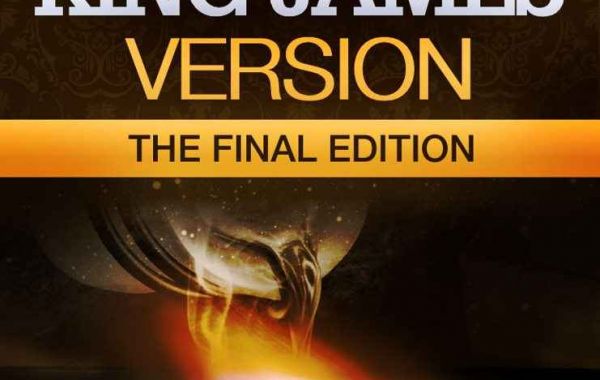Why The English Of The King James Bible Is Better Than That Of All The Modern Versions.
First, the KJB is precise in the use of the old pronouns in the second person, and that is necessary for a literal and accurate translation.
Modern translations can never match it.
Nominative Objective Possessive
Case Case Case
Present Day English
1st person s. I me my(mine)
1st person pl. we us our(ours)
2nd person s. you you your(yours)
2nd person pl. you you your(yours)
3rd person s. he, she him, her his, hers
3rd person pl. they them theirs
KJB English differs in 2nd person pronouns.
2nd person s. thou thee thy(thine)
2nd person pl. ye you your(yours)
Thee, thou, and thine when used in prayer and worship are Biblical and far more reverent. Thee, thou, and ye are precise in meaning. In John 3:7 we read: "Marvel not that I said unto thee, ye must be born again." When he said thee Jesus was speaking to one person, Nicodemus, but then by saying ye he meant that all of us, plural, must be saved. Today "you" may be both singular and plural, nominative or objective, and modern translations cannot make the meaning of John 3:7 unmistakably clear.
In the 10 commandments "Thou" is used, and so each individual personally falls under the commandment, not the aggregate of all persons. John 12:48 says that all shall stand before God and be judged individually: "He that rejecteth me, and receiveth not my words, hath one that judgeth him: the word that I have spoken, the same shall judge him in the last day."
Second, the KJB is easier to memorize because of frequent poetic rhythms in its syntax or construction of sentences. We can illustrate these rhythms by underlining accented syllables.
Trochaic rhythm, accent on the first syllable of two.
Psalm 34:13 Keep thy / tongue from / e-vil, and thy / lips from / speak-ing / guile
NASV Keep your tongue from evil, And your lips from speaking deceit. Note that deceit has two syllables with the accent on the second and so ruins the rhythm when substituted for guile.
Psalm 100:1 Make a / joy-ful / noise un / to the / Lord / all ye lands. Serve the / Lord with / glad-ness: / come be / fore his / pres-ence / with sing / ing
NASV Shout joyfully to the Lord Come before him with joyful singing; the rhythm of both lines is ruined.
Hymns Breth-ren / we have / met to / wor-ship
And a / dore the / Lord our / God
Come thou / fount of / ev-ry / bless-ing
Tune my / heart to / sing thy / grace
Iambic rhythm, accent on the second syllable of two.
Genesis 2:7 And man / be-came / a liv / ing soul NASV has being, with two syllables, for soul.
Psalm 73:2 But as / for me / my feet / were al / most gone; / my steps / had well / nigh slipped
Psalm 136:9 the moon / and stars / to rule / by night
Isaiah 52:1 A-wake / a-wake / put on / thy strength
NASV Awake, awake, Clothe yourself in your strength; the rhythm is lost.
Matthew 6:10 Thy king / dom come / thy will / be done / on earth
John 3:17 For God / sent not / his son / in-to / the world / to-con demn / the world,/ but that / the world / through him / might be / sav-ed
NASV For God did not send the Son into the world to judge the world, but that the world should be saved through Him. The rhythm is lost in both lines.
Hymns A-maz / ing grace / how sweet / the sound /
That saved / a wretch / like me
How sweet / the name / of Je / sus sounds
In a / be-lieve / ers ear
Both these last hymns are common meter. That means 8 syllables in the 1st line and 6 in the 2nd, 8 in the 3rd, 6 in the 4th, and so on.
The late Dr. B. R. Lakin, great preacher and orator, used to tell of his mother sitting on the porch churning butter, singing these old songs. How could she do it? Because they were so easy to memorize, having regular iambic or trochaic structure and divided into stanzas just as the Bible is divided into verses.
Sonnets of John Milton and William Shakespeare are all iambic pentameter, with 10 syllables or 5 feet per line, and so are easily learned. Milton became blind early in life but wrote these beautiful lines: "When I consider how my light is spent, ere half my days in this dark world and wide," an archaic, but sublime, way of saying I have lost my sight. He also gave us "Avenge O Lord thy slaughtered saints, whose bones, Lie scattered on the Alpine mountains cold." From Shakespeare: "When in disgrace with fortune and men's eyes I all alone beweep my outcast state." Is there a fundamental university ready to put Milton or Shakespeare into modern English? Never! Then why must they treat our Bible with both literary and theological disrespect?
Anapestic rhythm, accent on the third of three syllables.
Psalm 23:6 I will dwell / in the house / of the Lord / for e-ver
Psalm 116:15 Precious / in the sight / of the Lord / is the death / of his saints
NASV Precious in the sight of the Lord is the death of His godly ones; godly ones puts three syllables in place of one, saints.
Hymns Are you washed / in the blood / in the soul / cleans-ing blood / of the Lamb
Ho-ow firm / a foun da / tion ye saints / of the Lord
i-is laid / for your faith / in his ex / cell-ent word
Dactylic rhythm, accent on the first of three syllables.
Isaiah 14:12 How art thou / fall-en from / hea-ven O / Lu-ci-fer / Son of the / morn-ing
Hymn Mo-ment by / mo-ment I'm / kept in his / love /
Mo-ment by / mo-ment I've / light from a / bove
Cretic rhythm, accent on the first and third of three syllables.
James 1:19 swift to hear, / slow to speak, / slow to wrath
NASV quick to hear, slow to speak and slow to anger; anger has two syllables as opposed to one in wrath. The alliteration of the s words, swift, slow, and slow is lost by substituting quick.
Hymn Sil-ent night / Ho-ly night / all is calm / all is bright
God made us to be creatures of rhythm and orderly structure, fearfully and wonderfully made. There is the rhythm of night and day, sleeping and waking. Our breath is regular at a rate of 16 breaths per minute. Our hearts beat about 70 times per minute. Even our brain waves show rhythmic patterns. So order and structure must be expected in our Bible.
Contemporary music has no meter or regular rhythm with a fixed number of syllables per line. It is poorly done, slothful poetry, through composed instead of strophic; that is, of one piece and not divided into stanzas. The words do not fit the music properly. You easily recognize it by counting syllables per line. And you can also see that there is a direct relation between the poor poetry of contemporary worship and the poor rhythms of the new versions of the Bible.
The stanzas of the old hymns of Isaac Watts serve the same purpose as verse divisions in the KJB. Modern versions are divided into paragraphs. Verse numbers are submerged in the paragraphs, not clearly shown at the left margin.
Anyone who has listened to children saying Bible verses in unison on a church bus or in Sunday school has noticed the rhythmic, singsong quality of their speech. I have heard it often in chapel programs done by elementary Christian school students. This rhythm is important for memorization both in children and in adults. Why do we need to memorize? To hide the word in our hearts for spiritual warfare.
In the wilderness in Matthew 4 the Lord defeated the devil three times by the use of quotations from Deuteronomy, telling the devil "it is written." Of course he had no trouble quoting these scriptures. We must be ready to do the same, but our small minds need a Bible that is easily memorized and recalled.
Third, the KJB is closer to the Greek text because it keeps the inflected verb endings that are seen in Greek. Inflection simply means a turning or bending. Hebrew and Greek are inflectional languages, much more so than modern English. Hebrew is more inflectional than Greek. Biblical English should also be as inflectional as possible if we are to have a literal translation and one that shows the most respect for Hebrew and Greek. Inflection makes a language more compact, with shorter sentences, and we see shorter sentences in the KJB.
Inflected verb endings, nominative case singular
English Greek
I say lego
Thou sayest legeis
He saith legei
I loose luo
Thou loosest lueis
He looseth luei
I honor timao
Thou honorest timaeis
He honoreth timaei
I give didomi
Thou givest didos
He giveth didosi
The s sound predominates in the ending of sayest, and the letter sigma or s is there in Greek; the i sound is heard in saith and giveth and iota or i is at the end in Greek. The KJB keeps the inflective similarity between Greek and English verb endings. Inflection makes the pronoun and the verb conform to and fit with each other. Inflected verb endings make a great contribution to the rhythm and beauty of the KJB. Remember John 21:3: Si-mon / Pe-ter sa-ith / un-to / them. It is trochaic. John 21:5 is iambic: Then Je / sus sa / ith un / to them. Without the inflected verb ending that gives us saith in place of said, and without the Biblical word unto, that rhythm and beauty are lost.
Hearing is by far the most important means of acquiring language and speech. Infants are more sensitive to trochaic rhythm and use rhythm in the speech that they hear to learn to speak themselves. Rhythm in the speech of the mother and father helps an infant acquire syntax, from hearing that rhythm. Syntax is the combination of syllables and words into sentences to express thought.
In 30 years of pediatric practice, I have never seen a 4 year old say the alphabet, the basis of all phonics and reading and Bible knowledge, without first singing it to the simple trochaic rhythm of "Twinkle, twinkle little star," with 7 syllables in every line. How important, for children and adults, are the rhythms in the KJB which make it so easy to memorize!
James H. Sightler, M.D.
Sightler Publications
February 1, 2003







